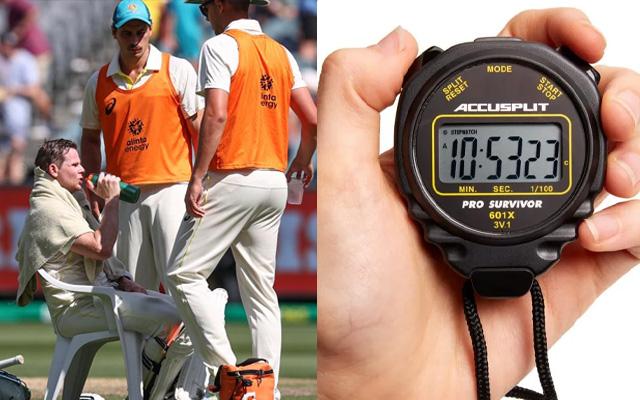Explained: What is the new 'Stop Clock' rule in international cricket?
In the new men’s playing conditions, an electronic clock will be used to monitor the time taken by the bowling side to start a new over.
View : 19.1K
2 Min Read


The International Cricket Council (ICC) has brought in a new ‘stop clock’ rule in international cricket from Monday, December 11 to tackle the issues of slow-over rate in international matches. In the new men’s playing conditions, an electronic clock will be used to monitor the time taken by the bowling side to start a new over and it will also assist in penalizing teams for time wastage.
The digital clock has been introduced on a trial basis between December 2023 and April 2024 and will be used across 59 matches. The rule came into effect from the first T20I between England and West Indies on Tuesday, December 12 and a stop watch was used to monitor the time between overs during the match.
Also Read: Stop Clock trial to be in place from first West Indies vs England T20I in Barbados
"Under clause 41.9 of the revised Men's ODI and T20I playing conditions, which deals with provisions against time wasting by the fielding side, the clock has been added under sub-clause 41.9.4," the ICC had said in a statement.
The clock rule gives 60 seconds to the bowling side to start a new over with the timer visible to everyone on the big screen. The fielding side will necessarily have to start a next over within the prescribed time period and they will be given two warnings if they fail to do so.
Teams will be given five run penalty after two warnings
However, the failure to comply with the rules on the third occasion will lead to a five-run penalty. The third umpire starts the clock right after the last ball of the previous over has been called dead or after the completion of any review on the last ball.
Also Read: Travis Head, Nahida Akter crowned ICC Players of the Month for November
If the fielding team is ready to bowl the next over within the stipulated time but the batting team isn’t then the umpires will see if the clause for batters wasting time is applicable to the situation.
However, there are a few exceptions in the rule and the clock can be stopped in situations such as when a new batter walks in between overs, drinks interval has been taken, umpire-approved on-field treatment of a player and things out of control of the fielding side.
Download Our App